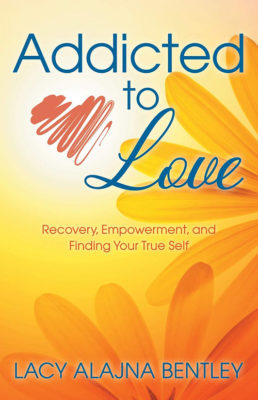 Lacy Alajna Bentley
Lacy Alajna Bentley
Sex and Relationship Healing is pleased to partner with Lacy Bentley, host of our Tuesday Women’s Sex/Love Addiction drop-in discussion group and our Thursday Women’s Porn Addiction drop-in discussion group, for our Summer of Love (Addiction). This wonderful series examining women, love addiction, fantasy, pornography, and healing is drawn from Lacy’s book, Addicted to Love.
* * * * * * * * * *
Investigation can be easily summed up in the concept of compassionate curiosity. It is entirely possible you have never asked yourself many of the questions I am going to have you think about in the next few posts to this site. As you grow in recovery, you will get more rigorous with your self-investigation. For example, what I now consider a relapse in myself would not have even made my awareness years ago. My awareness has branched to other areas of my life. I love this, because as we dig deep into our compulsive behaviors and the beliefs that drive them, we become open to other areas that need improvement. Recovery can then go deep in each area, and wide as it spreads through our lives.
Areas of intimacy to consider inventorying include Spiritual, Romantic, Social, Sexual, Physical, Professional, Emotional, and Intellectual. You may find other areas that are also important. If so, awesome. Count those, too. This is your journey, and you know what areas need the most attention right now.
These ten areas of intimacy will be examined over the course of the next few blogs. This post will cover Spiritual, Romantic, and Social. Future posts will cover the remaining areas of investigation.
Spiritual
This form of intimacy is about your relationship with God and your own Spirit. We are not just complex cells roaming around with no purpose. We have a divine creator, and He wants to connect with us. He can also help us connect to ourselves and others in spiritual ways. Anytime you feel a soul-to-soul connection, you are connecting through your spirit.
A soul is the body and spirit. One deeply destructive spiritual habit is judging the soul of another as “shame-based” or deciding we know what someone else is thinking, feeling, or should do. For example, we all go into shame. You can tell when you are in shame because you might feel small, weak, helpless, or, on the other hand, you might feel superior to others, like if they just did things your way everything would be fine.
It may be true that you know a better way, but it’s not OK to insist others “obey” you and do what you say, or to give them unsolicited advice. An adult with healthy boundaries will not tell another adult what they should do unless they are asked for ideas. Likewise, an adult living a recovered life will not decide when another person is “in shame,” and they certainly won’t diagnose it out loud. These are judgment calls outside of the necessary judgment of who is safe and who is not. In fact, either of these behaviors make the one advising or diagnosing an unsafe spiritual and emotional source of support.
Even God does not give unsolicited advice or judge without all the information. Additionally, God does not tell others “You are a sinner.” He encourages them to get curious about themselves by stating principles of truth and examples of what is right. That is how to be spiritually intimate with another soul.
There is much more to this, but what you have now will get you started on the right path. I’ll give you just a few questions to ask yourself about how you are doing with spiritual intimacy to help you conceptualize a little better.
- When you need to assess a situation, do you do so compassionately, even if you need to set boundaries?
- When someone shares an intimate part of their lives, do you hold it in reverence and care, or do you judge and label them, trying to solve their problem instead of supporting them?
- Are you uncomfortable in spiritual settings that may not be your own? If so, and if nothing illegal or harmful is happening, chances are judgment is in play.
As we learn to be compassionate and gentle with ourselves and others, our entire psyche relaxes. We don’t have to agree with or fully understand each other, but if our spirits are well inventoried and managed, we can still see the good intentions, even if we disagree on the application.
Romantic
Romantic intimacy is the flirting, fun, tantalizing intimacy shared between two people. When a married woman is spending this highly charged energy on a man (or woman) other than her spouse, she is on dangerous ground because this is the beginning of an emotional affair.
I get that flirting and getting that attention back is exciting. However, the playful banter has no place outside of marriage if we want to protect our hearts and keep our heads where they belong. I used to flirt like I was breathing – without even realizing it. That doesn’t mean I was innocent; it means I was numb and irresponsible with my sexual and romantic power.
Flirting is a big part of singlehood, and hopefully marriage. Do we use it wisely and take seriously the emotions and desires it incites? You are not responsible for what another person does with your behavior, but you are certainly responsible for the intentional misuse of your sexuality. Don’t play with the fire of romantic attraction and language.
Social
Social intimacy represents our relationships with friends and others we encounter out in the world. How do we treat others? Are we kind? Do we show respect and kindness to everyone? Is there any group of people we feel are less than us, or at least less deserving of respect? Do we shout loudly and forcefully that our voice must be heard, then refuse to listen to someone else’s voice? How we treat others says so much more about us than it does about them. Sadly, many of our behaviors are learned. Thankfully, we can choose to release them and do things differently!
* * * * * * * * * *
If you or someone you care about is struggling with love addiction, please check out the FREE Women’s Sex/Love Addiction Drop-In Discussion Group on this website, or, for males, any of the FREE Men’s Drop-In Discussion groups for addicts. (Most of the men’s group are listed as sex/porn addiction, but love addicts are welcomed and generally benefit.)

